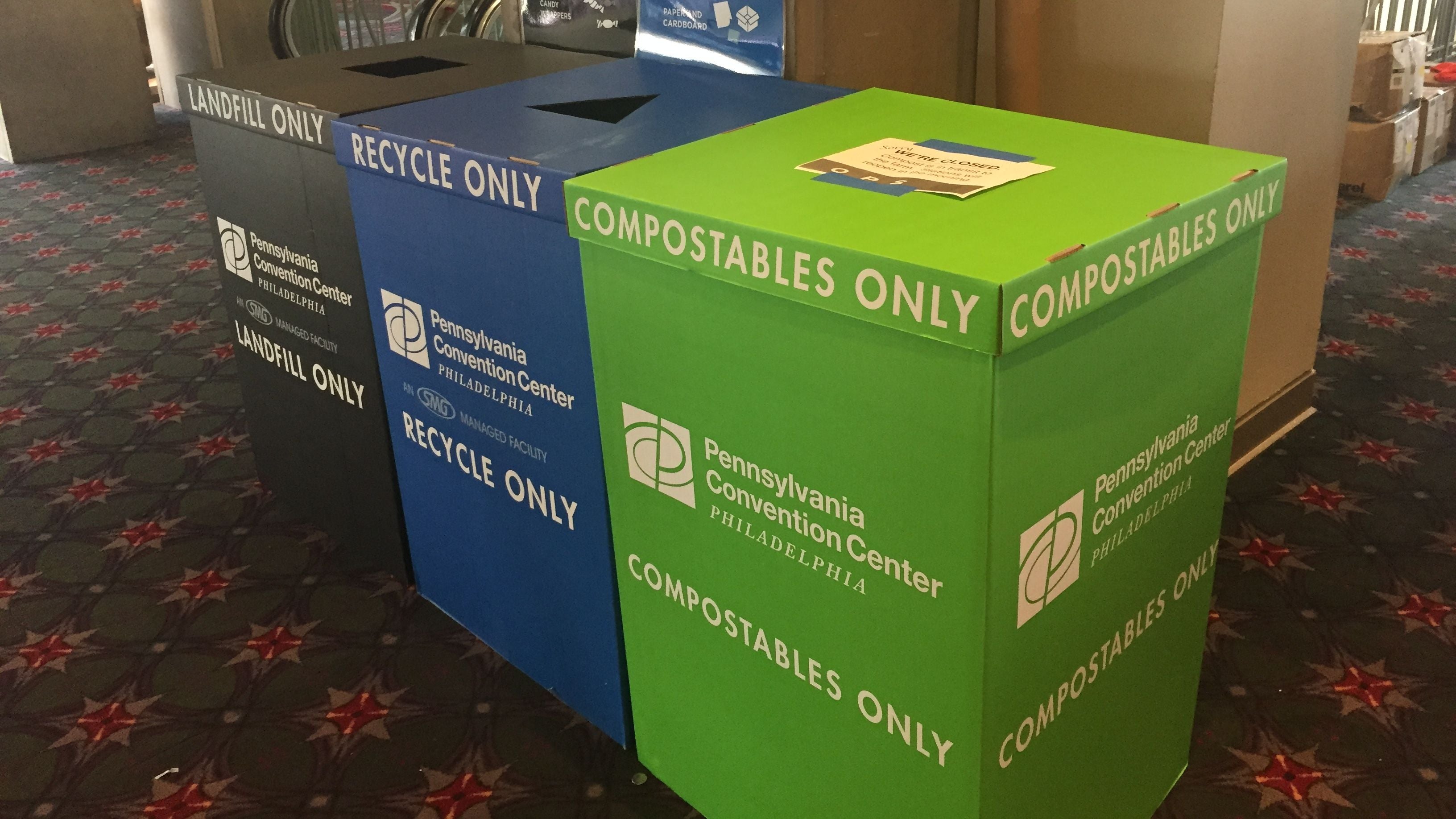Democrats talk sustainability in party platform, walk sustainability at convention
Listen
(Irina Zhorov)
If you’re looking for a trash can at the Pennsylvania Convention Center or the Wells Fargo Center, where the Democratic National Convention events are taking place this week, you’ll likely come across a set of three bins: one for recycling; one for compost; and one for the landfill.
A Green Team volunteer standing by offers cheery instruction on what to dispose of where. Paper cups go in the compost, and the recycling is one stream, meaning aluminum, cardboard, and plastic go in the same receptacle. The black landfill box is the last resort.
The goal is to divert 85 percent of the convention’s waste from the landfill.
The Democratic Party’s platform has lofty goals on the environment, but the convention itself is also trying to implement sustainability initiatives while hosting 50,000 people.
The bins are the most visible piece of this larger sustainability plan, which includes promoting voluntary measures such as using mass transit and sharing bikes, encouraging the use of locally produced food and donating uneaten food to pantries and emergency meal providers.
Officials will also track how much energy the venues consume during the convention. Utility PECO and its parent company, Exelon, will use that data to buy carbon credits.
“What we will do is this: Exelon will purchase carbon-free offsets representing a combination of nuclear, hydro, wind and solar energy to effectively eliminate the carbon footprint of the Democratic National Convention,” said Bill Von Hoene, Exelon senior executive vice president and chief strategy officer.
Aiming to revitalize efforts
Three Squares, a sustainability consulting company, has been organizing the convention’s greening. Founder Jaime Nack said the efforts are a chance to help Philadelphia on its own sustainability goals, in addition to the event’s.
For example, she said the Wells Fargo Center and the Convention Center both have composted in the past, but the closing of a major composting facility has slowed organic waste diversion.
“So one of our key goals in the convention is to really attach them to newer compost facilities, implement the system again, breathe new life into the system, so that system can stay in place from convention and beyond,” Nack said.
But she would not say where this composting material is being sent, so we couldn’t confirm whether this really will build capacity for Philadelphia in the long run.
Nack said an even more important goal of these efforts is education.
“When you have such a diverse audience, coming from different regions, different cities that may or may not have recycling and infrastructure in place, a lot of this is educating them about what happens in other cities.
“Potentially, they could bring some of these lessons learned back to their cities and then implement changes at home,” she said.
Future applications
In this way, the convention may also have some lessons to teach to the event-planning industry at large.
After all, sustainability is a relatively new concern for the DNC. In 2004, in Boston, greening efforts were led by an outside environmental group that formed a nonprofit organization for the occasion. Its executive director, Dan Ruben, had to raise his own salary.
He said by 2008, when Denver hosted the DNC, it was already a changed story. “What was different was that the city and the Democratic Party were on board from the beginning,” he said.
The Denver convention has become a case study for events and sustainability. Seventy-two percent of waste was diverted from landfills that year, with some venues exceeding the 85 percent goal.
“It really helped trigger that there was a demand for moving in this direction for the events industry as a whole,” Nack said. “And since then, international events standards developed for sustainability.”
This year’s sustainability initiatives will be evaluated when the convention ends, when the tonnages of garbage, compost and recycling are added up, energy-saving measures gauged and carbon credits purchased.
Meanwhile, in the early days of this convention, some of the composting bins were closed, and Green Team volunteers were not staffing each one, as planned. But that seems to be improving.
WHYY is your source for fact-based, in-depth journalism and information. As a nonprofit organization, we rely on financial support from readers like you. Please give today.

